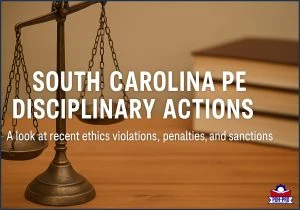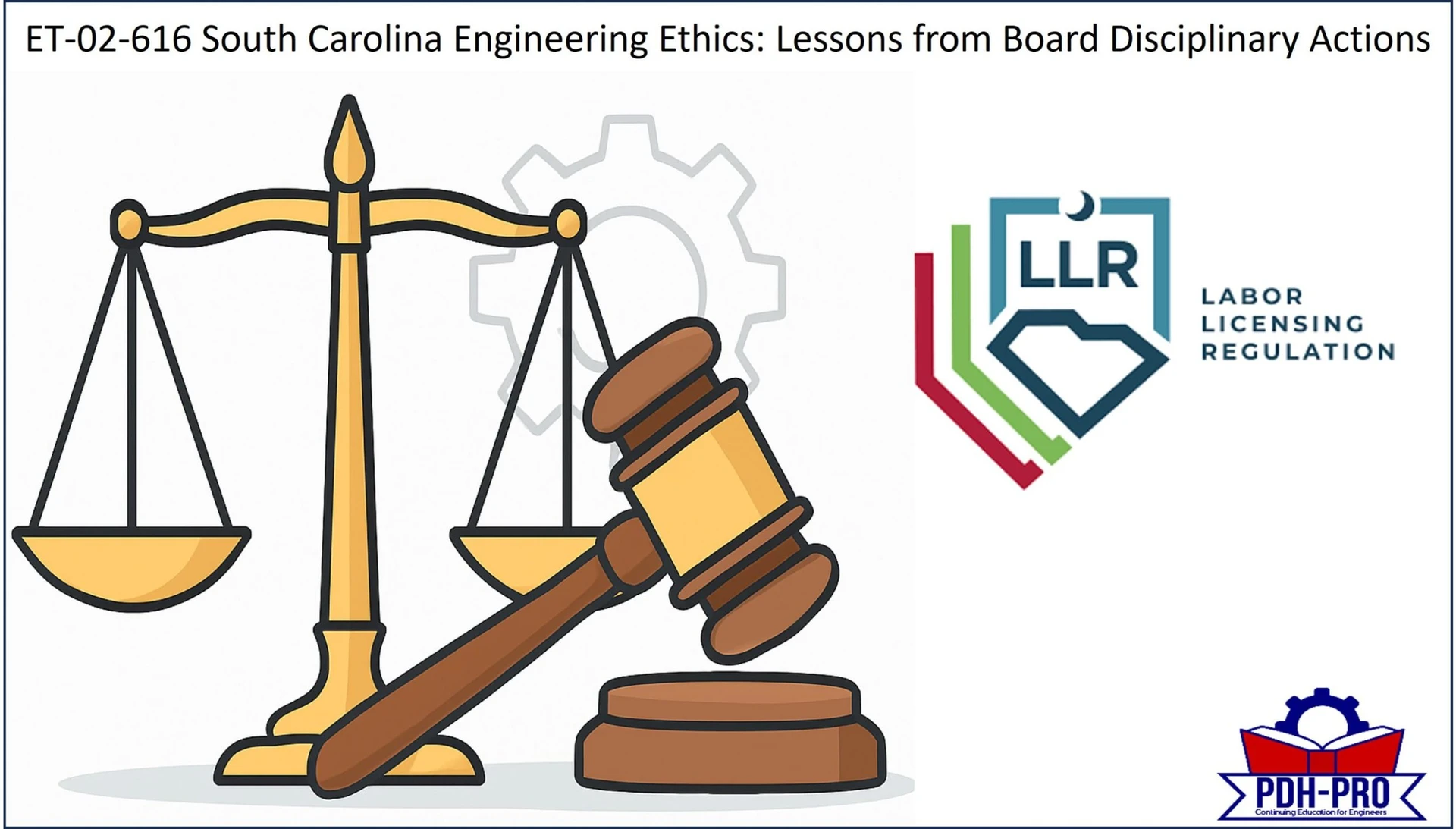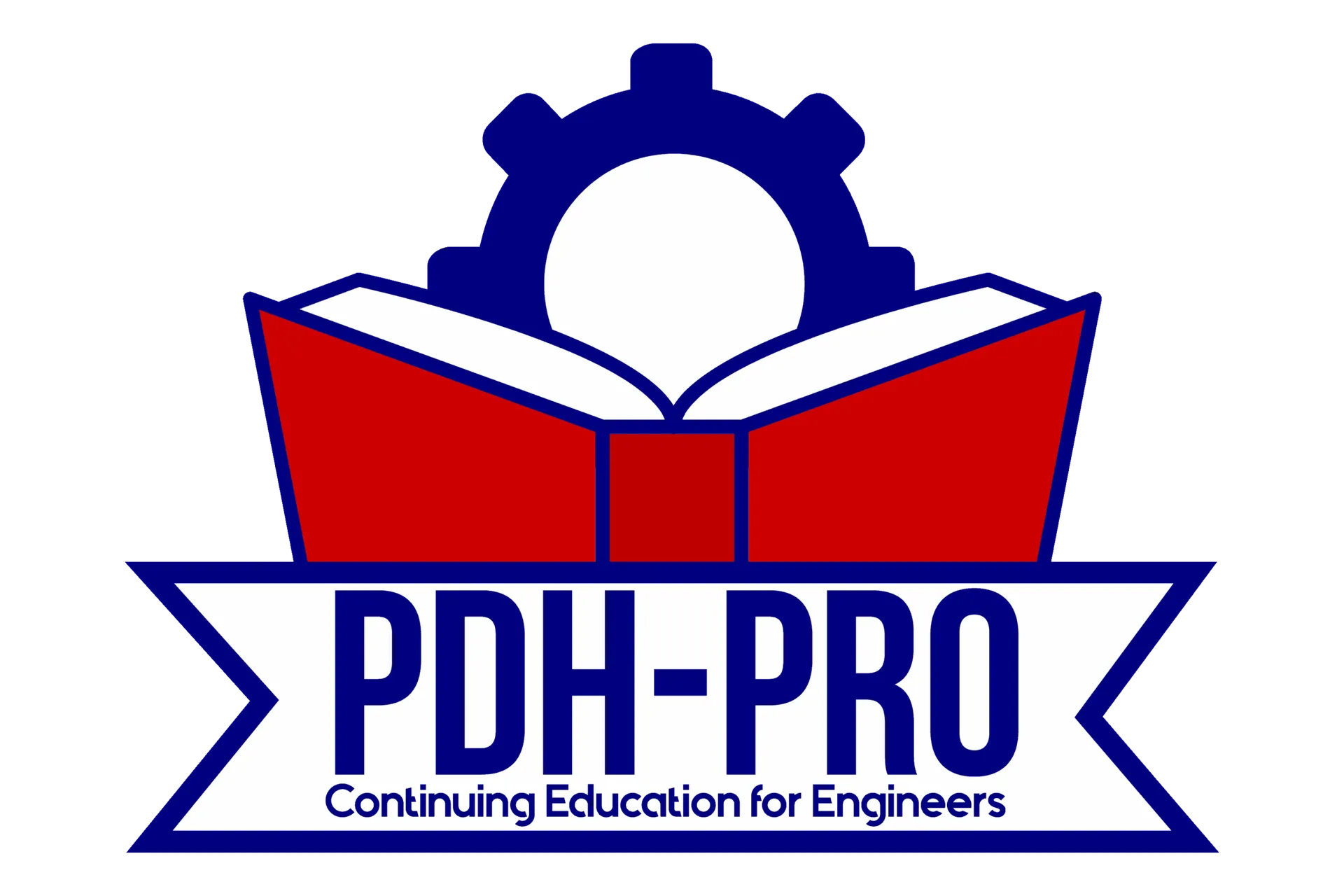
Written by: Jordan Ellis, PE
Published: July 9, 2025 | Updated: November 20, 2025
As a licensed professional engineer here in South Carolina, I take my responsibilities seriously—not just to clients and the public, but to the integrity of our profession. That’s why I make a point to keep up with the disciplinary actions issued by the South Carolina Board of Registration for Professional Engineers and Surveyors. They’re not just enforcement cases—they’re real examples of what can happen when engineers fall short of their professional obligations, whether intentionally or through oversight.
Reviewing these cases helps me stay vigilant in my own practice. It’s a reminder that things like continuing education, firm registration, license renewal, and ethical conduct aren’t just boxes to check—they’re essential to maintaining the trust we’ve worked hard to earn as engineers.
South Carolina enforcement trends reflect many of the same compliance concerns outlined in what every PE should know about professional engineer disciplinary actions overview, especially regarding ethical duties and public protection. Check out my article What are the Most Common Ethics Violations for Professional Engineers.
Ethics Course for South Carolina Engineers

This one-hour online course helps South Carolina Professional Engineers earn guaranteed PDH credit while enhancing their understanding of ethical responsibilities and state board requirements. By examining real disciplinary cases, participants will learn to identify common violations, navigate the Board’s disciplinary process, and apply practical strategies to maintain compliance and protect their professional license. Ideal for engineers committed to upholding public safety and the highest standards of integrity in South Carolina.
South Carolina PE Disciplinary Cases
In the table below, I’ve summarized the most recent enforcement actions taken by the Board. If you’re licensed in South Carolina, I recommend taking a few minutes to look through them. Each case includes a summary of the violation(s) and the sanctions imposed.
| Case Number(s) | Summary of Violation | Sanctions |
| 2023-18 | PE practiced engineering in South Carolina while the license was expired. | Public reprimand, $500 civil penalty. |
| 2023-17 | PE did not update the Board with new firm information and practiced through an unregistered firm. | Public reprimand, $1,000 civil penalty. |
| 2023-12 | PE practiced engineering while license was expired and failed to notify the Board of firm closure. | Public reprimand, $1,000 civil penalty. |
| 2023-11 | PE failed to complete continuing education requirements, practiced while license was lapsed. | Public reprimand, $1,000 civil penalty. |
| 2023-07 | PE failed to notify the Board of out-of-state disciplinary action and completed false renewal. | Public reprimand, $500 civil penalty. |
| 2023-06 | PE failed to respond to multiple Board communications and practiced while license was expired. | Public reprimand, $1,000 civil penalty. |
| 2022-38 | PE failed to notify the Board of changes in firm ownership and allowed practice through unregistered firm. | Public reprimand, $1,000 civil penalty. |
| 2022-31 | PE practiced engineering after license expired; failed to respond to Board inquiries. | Public reprimand, $1,000 civil penalty. |
| 2022-27 | PE practiced engineering while license was lapsed and continued using PE seal. | Public reprimand, $500 civil penalty. |
The failure to complete or properly document continuing education is a frequent issue, leading to fines and reprimands, as seen in recent Ohio engineering board disciplinary actions.
The types of violations observed in South Carolina closely parallel the issues detailed in real New Jersey PE disciplinary actions and outcomes, where board rulings commonly address insufficient oversight and inaccurate engineering submissions. The consequences for failing to disclose out-of-state discipline are serious, as illustrated by a series of West Virginia PE board cases where multiple engineers were fined for this exact violation.
Summary of South Carolina PE Violations by Type
Most Common Types of Disciplinary Violations
This table categorizes the recent disciplinary actions issued by the South Carolina Board of Registration for Professional Engineers and Surveyors. Each violation type is grouped and tallied, along with associated penalties and fine ranges.
| Violation Type | Number of Cases | Typical Sanctions | Fine Range |
| Practicing with an Expired or Lapsed License | 7 | Public reprimand, civil penalty | $500 – $1,000 |
| Operating Through an Unregistered Engineering Firm | 3 | Public reprimand, civil penalty | $1,000 |
| Failure to Notify Board of Firm Closure or Changes | 2 | Public reprimand, civil penalty | $1,000 |
| Failure to Respond to Board Communications | 2 | Public reprimand, civil penalty | $1,000 |
| Failure to Complete Continuing Education | 1 | Public reprimand, civil penalty | $1,000 |
| Failure to Report Out-of-State Discipline | 1 | Public reprimand, civil penalty | $500 |
| Misuse of PE Seal While License Was Inactive | 1 | Public reprimand, civil penalty | $500 |
Several patterns in South Carolina cases also align with the findings in Maryland professional engineer disciplinary actions explained, which reinforce the importance of maintaining proper documentation and meeting statutory requirements.
Why Ethics and Compliance Matter for PEs
As professional engineers, we hold a license that signifies more than technical competence—it represents a public trust. We’re legally and ethically responsible for protecting public health, safety, and welfare. That’s why compliance with licensing laws and ethical standards isn’t optional or procedural—it’s foundational to our role in society.
Even seemingly minor oversights—like failing to renew a license, missing continuing education hours, or neglecting to notify the Board of a change in firm status—can have serious consequences. These aren’t just administrative issues. When we disregard the rules that govern our profession, we risk not only disciplinary action but also the integrity of the engineering field as a whole.
Whether it’s maintaining active licensure, following professional codes of conduct, or ensuring clear and accurate communication with clients, every action we take reflects on our fitness to practice. Staying informed about enforcement actions—especially those taken in our own state—helps us remain aware, accountable, and committed to the values that define professional engineering.
Real Examples of Violations
To better understand the importance of ethics and compliance, let’s look at a few real-world disciplinary cases from South Carolina involving licensed professional engineers. These examples highlight common missteps that can lead to sanctions—and serve as important reminders for all of us.
Practicing Engineering After License Expiration
In one case, an engineer allowed their professional license to lapse but continued to offer engineering services. While this might seem like a simple administrative oversight, South Carolina law prohibits any engineering practice without an active license. The result? The Board imposed a formal reprimand, a $500 civil penalty, and mandated completion of an ethics course.
Lesson learned: Always track your license expiration date and complete your renewal well in advance. Practicing with an expired license is treated as unlicensed activity.
Operating Through an Unlicensed Firm
Another engineer was disciplined for providing services through a firm that had not properly registered with the Board. Even though the individual engineer was licensed, the law requires that firms also be authorized to offer engineering services in South Carolina. The Board issued a reprimand and a $2,000 fine.
Lesson learned: Verify that your firm is properly registered with the South Carolina Board—whether you own it or simply work through it.
Failure to Notify Board of Firm Dissolution
In a third case, a licensed engineer continued to operate under the name of a firm that had been administratively dissolved. They failed to notify the Board, which is a requirement under the licensing statute. The Board sanctioned the engineer with a formal reprimand and a $1,500 fine.
Lesson learned: Keep the Board informed of any changes to your professional practice, including firm status or changes in business structure.
Each of these violations could have been prevented with better awareness and more careful attention to licensing rules. Staying compliant isn’t just about avoiding penalties—it’s about upholding the integrity of our profession.
Penalties and Fine Ranges
Violating engineering ethics or licensing regulations in South Carolina can result in consequences that go far beyond a simple fine. The South Carolina Board of Registration for Professional Engineers and Surveyors takes its role in protecting public health, safety, and welfare seriously—and it enforces compliance accordingly.
Financial Penalties:
Fines in recent disciplinary cases ranged from as low as $250 to as high as $517, depending on the severity of the violation. While these amounts may not seem overwhelming on their own, they often come paired with other repercussions.
Reputational Impact:
Every formal disciplinary action becomes public record. A public reprimand can damage your professional reputation and credibility, potentially affecting current and future work opportunities—especially with clients or agencies that screen for licensing history.
Licensing Sanctions:
Some violations lead to license suspension, probation, or mandated continuing education (such as ethics courses). Even seemingly minor infractions—like failing to update the Board on an address change—can escalate if left unaddressed.
What Engineers Can Do to Stay Compliant
To maintain a clean license record and uphold the standards of our profession, here’s a practical checklist every South Carolina PE should follow:
- Keep your license active: Track renewal deadlines and complete all required continuing education (CE) credits.
- Update the Board: Notify the Board of any changes to your name, mailing address, or employment firm.
- Disclose out-of-state actions: If you’ve been disciplined in another state, report it promptly—don’t wait for it to surface in an audit.
- Respond quickly: Always reply to Board communications or audits in a timely and professional manner.
- Avoid unauthorized practice: Never offer or provide engineering services under a firm that’s not properly registered with the Board.
- Stay informed: Periodically review the Board’s rules and policy updates to stay ahead of changes.
By following these steps, we can all help preserve the integrity of the profession while protecting ourselves from preventable disciplinary issues.
Conclusion
Staying compliant with South Carolina’s engineering regulations is more than a formality—it’s a professional obligation. Even minor oversights like letting a license lapse or failing to notify the Board can lead to fines, suspensions, and reputational damage. These real-world cases serve as reminders to stay current, respond promptly, and take our ethical responsibilities seriously. Compliance protects your license—and the integrity of our profession.
Written by: Jordan Ellis
